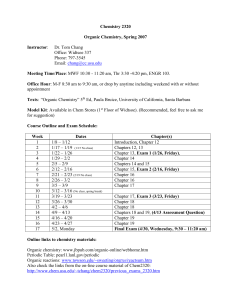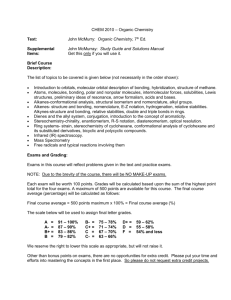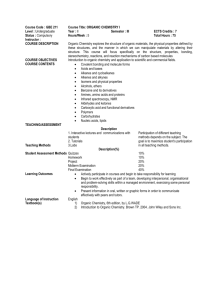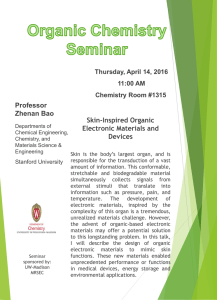CHEM 251 ORGANIC CHEMISTRY I
advertisement
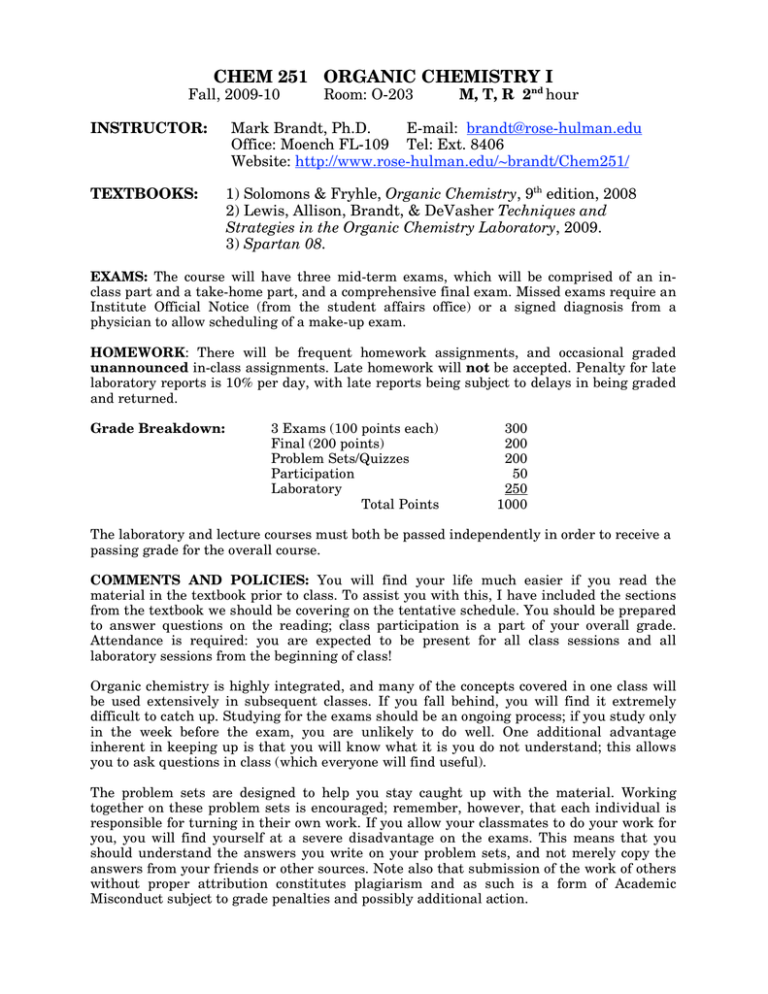
CHEM 251 ORGANIC CHEMISTRY I Fall, 2009-10 INSTRUCTOR: TEXTBOOKS: Room: O-203 M, T, R 2nd hour Mark Brandt, Ph.D. E-mail: brandt@rose-hulman.edu Office: Moench FL-109 Tel: Ext. 8406 Website: http://www.rose-hulman.edu/~brandt/Chem251/ 1) Solomons & Fryhle, Organic Chemistry, 9th edition, 2008 2) Lewis, Allison, Brandt, & DeVasher Techniques and Strategies in the Organic Chemistry Laboratory, 2009. 3) Spartan 08. EXAMS: The course will have three mid-term exams, which will be comprised of an inclass part and a take-home part, and a comprehensive final exam. Missed exams require an Institute Official Notice (from the student affairs office) or a signed diagnosis from a physician to allow scheduling of a make-up exam. HOMEWORK: There will be frequent homework assignments, and occasional graded unannounced in-class assignments. Late homework will not be accepted. Penalty for late laboratory reports is 10% per day, with late reports being subject to delays in being graded and returned. Grade Breakdown: 3 Exams (100 points each) Final (200 points) Problem Sets/Quizzes Participation Laboratory Total Points 300 200 200 50 250 1000 The laboratory and lecture courses must both be passed independently in order to receive a passing grade for the overall course. COMMENTS AND POLICIES: You will find your life much easier if you read the material in the textbook prior to class. To assist you with this, I have included the sections from the textbook we should be covering on the tentative schedule. You should be prepared to answer questions on the reading; class participation is a part of your overall grade. Attendance is required: you are expected to be present for all class sessions and all laboratory sessions from the beginning of class! Organic chemistry is highly integrated, and many of the concepts covered in one class will be used extensively in subsequent classes. If you fall behind, you will find it extremely difficult to catch up. Studying for the exams should be an ongoing process; if you study only in the week before the exam, you are unlikely to do well. One additional advantage inherent in keeping up is that you will know what it is you do not understand; this allows you to ask questions in class (which everyone will find useful). The problem sets are designed to help you stay caught up with the material. Working together on these problem sets is encouraged; remember, however, that each individual is responsible for turning in their own work. If you allow your classmates to do your work for you, you will find yourself at a severe disadvantage on the exams. This means that you should understand the answers you write on your problem sets, and not merely copy the answers from your friends or other sources. Note also that submission of the work of others without proper attribution constitutes plagiarism and as such is a form of Academic Misconduct subject to grade penalties and possibly additional action. CHEM 251 TENTATIVE CLASS SCHEDULE Date Sept. 3 7 8 10 14 15 17 21 22 24 28 29 Oct. 1 5 6 8 12 13 16 19 20 22 26 27 29 Nov. 2 3 5 9 10 12 TBA Week 1 2 3 4 5 6 7 8 9 10 Topic Introduction to Organic Chemistry Chemical bonding, isomers, and unsaturation Orbitals, hybridization, structure, and stability Functional groups Infrared spectroscopy Acid-base reaction chemistry Acid-base reaction chemistry Acid-base chemistry & Thermodynamics Hydrocarbon properties and nomenclature Exam I (Chapters 1, 2, & 3) Hydrocarbon properties and nomenclature Hydrocarbon properties and nomenclature Stereochemistry & isomers Stereochemistry & isomers Stereochemistry & optical activity Stereochemistry & optical activity Stereochemistry & optical activity Exam II (Chapters 4, & 5, and 7) Fall Break (No class) Nucleophilic substitution reactions Nucleophilic substitution reactions Nucleophilic substitution reactions Elimination reactions Elimination reactions Elimination reactions Synthetic use of reactions Synthetic use of reactions Exam III (Chapters 8, 9, and 10) Addition reactions Addition reactions Review Final Exam (Chapters 1-8) Chapter 1 1 1 2 2 3 3 3 4 4 4 4 5 5 5 5 6 6 6 6 7 7 7 7,8 8 8 Laboratory Schedule Topic Check-in and Introduction to Spartan (please bring laptop to lab) Distillation and Introduction to IR; Molecular Orbitals Spartan Exercise Recrystallization Space and Conformation Spartan Exercise (please bring laptop to lab) Chemical Extraction, Part I Fall Break (no lab) Chemical Extraction, Part II Nucleophilic Substitution Reactions Dehydration of an Alcohol Check-out CHEM 251L Website: http://www.rose-hulman.edu/~brandt/OrganicLab/
